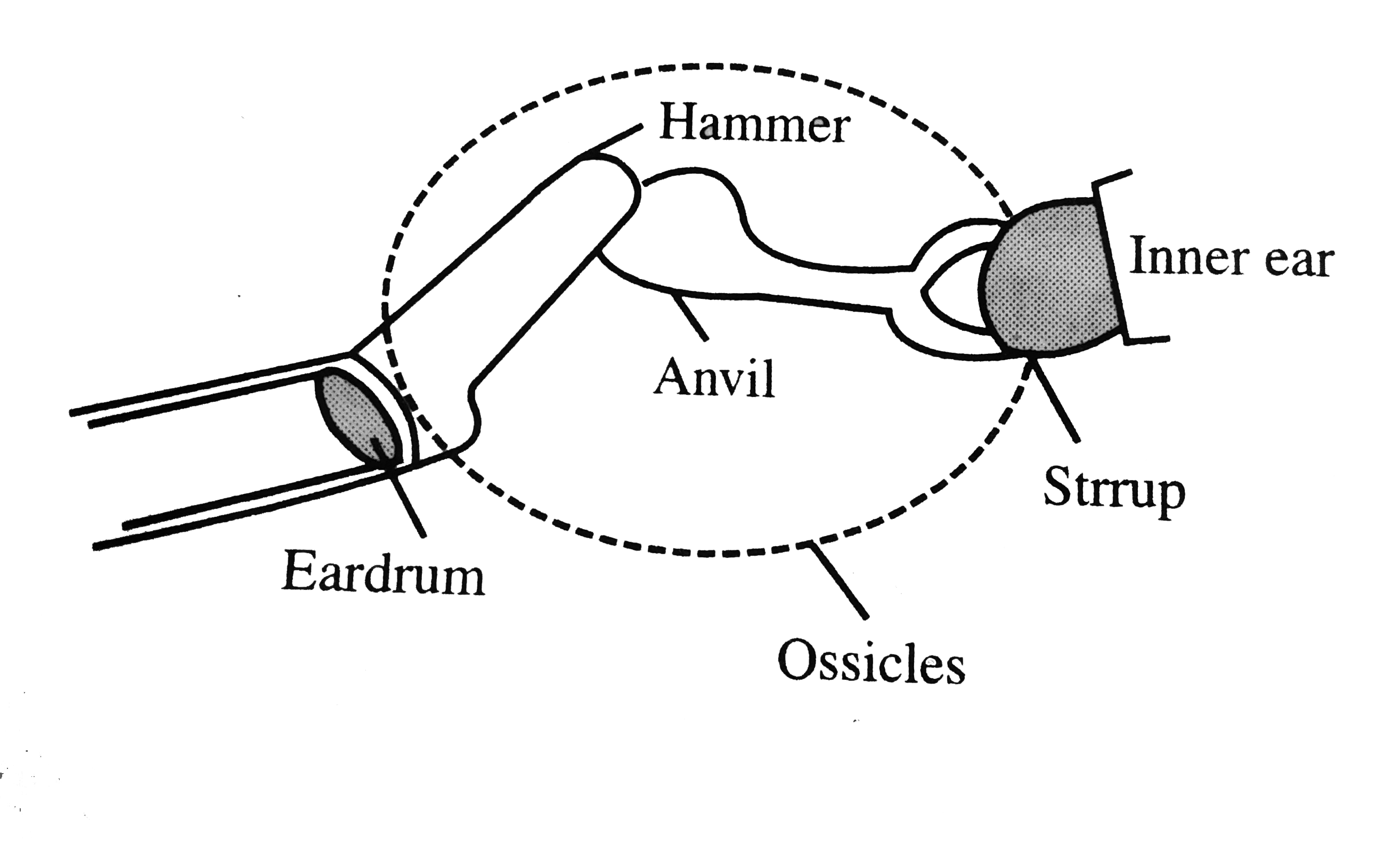
When a sound wave enters the ear, it sets the eardrum into oscillation, which in turn causes oscillation of 3 tiny bones in the middle ear called ossicles. This oscillation is finally transmitted to the fluid filled in inner portion of the ear termed as inner ear, the motion of the fluid disturbs hair cells within the inner ear which transmit nerve impulses to the brain with the information that a sound is present. The theree bones present in the middle ear are named as hammer, anvil and stirrup. Out of these the stirrup is the smallest one and this only connects the middle ear to inner ear as shown in the figure below. The area of stirrup and its extent of connection with the inner ear limits the sensitivity of the human ear consider a person's ear whose moving part of the eardrum has an area of about and the area of stirrup is about . The mass of ossicles is negligible. As a result, force exerted by sound wave in air on eardum and ossicles is same as the force exerted by ossicles on the inner ear. Consider a sound wave having maximum pressure fluctuation of from its normal equilibrium pressure value which is equal to . Frequency of sound wave in air is . Velocity of sound wave in fluid (present in inner ear) is . Bulk modulus of air is . Bulk modulus of fluid is .
Q. Find the pressure amplitude of given sound wave in the fluid of inner ear.
The correct Answer is:D
The force exerted on inner ear is same as that of the force exerted on eardrum, due to negligible mass of ossicles.
Pressure amplitude is given by
Topper's Solved these Questions
- SOUND WAVES AND DOPPLER EFFECTBook:CENGAGE PHYSICS ENGLISHChapter:SOUND WAVES AND DOPPLER EFFECTExercise:Integer
Explore 16 Videos
- SOUND WAVES AND DOPPLER EFFECTBook:CENGAGE PHYSICS ENGLISHChapter:SOUND WAVES AND DOPPLER EFFECTExercise:Assertion-Reasoning
Explore 24 Videos
- RIGID BODY DYNAMICS 2Book:CENGAGE PHYSICS ENGLISHChapter:RIGID BODY DYNAMICS 2Exercise:Interger
Explore 2 Videos
- SUPERPOSITION AND STANDING WAVESBook:CENGAGE PHYSICS ENGLISHChapter:SUPERPOSITION AND STANDING WAVESExercise:Comprehension Type
Explore 5 Videos
Similar Questions
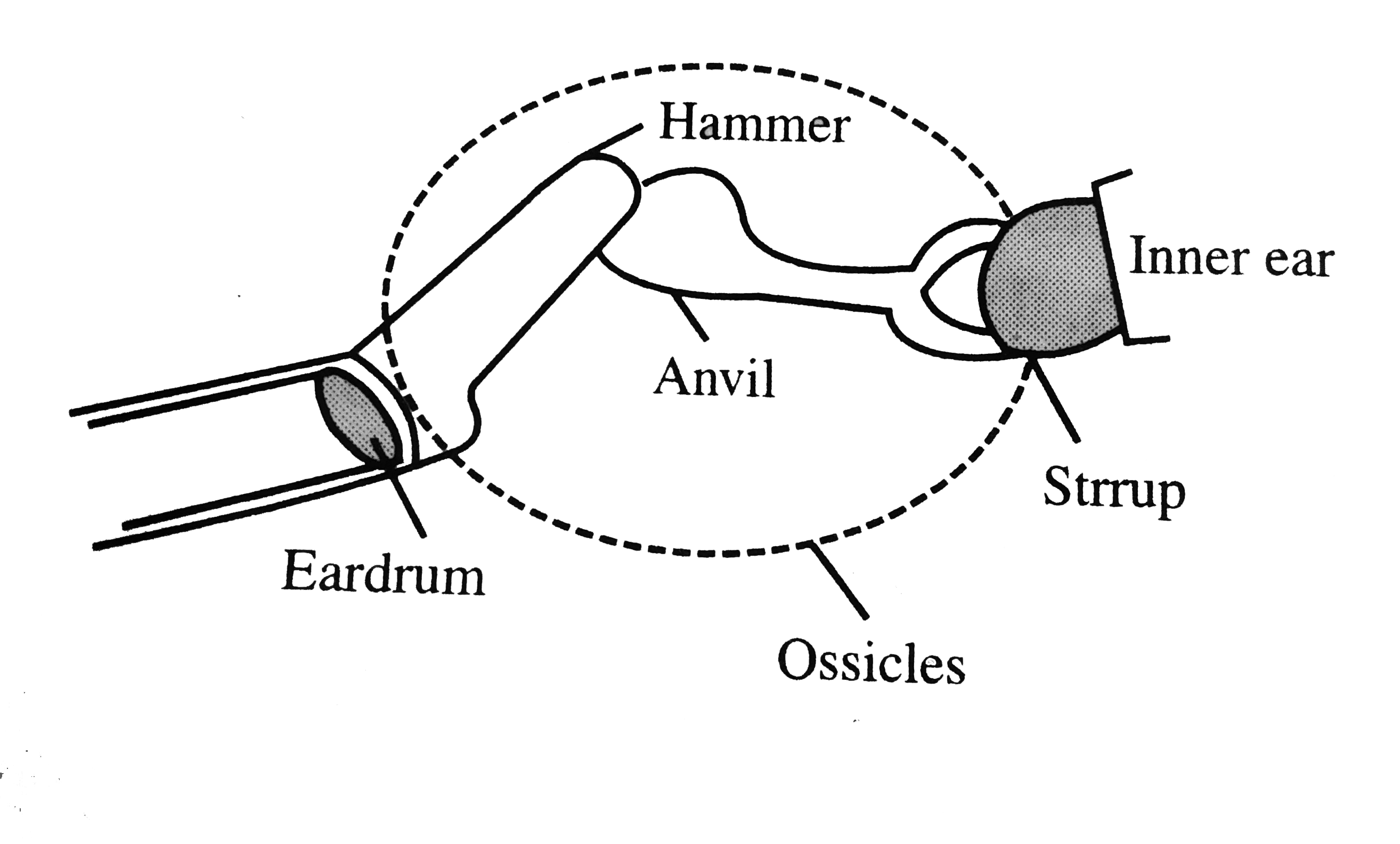
When a sound wave enters the ear, it sets the eardrum into oscillation, which in turn causes oscillation of 3 tiny bones in the middle ear called ossicles. This oscillation is finally transmitted to the fluid filled in inner portion of the ear termed as inner ear, the motion of the fluid disturbs hair cells within the inner ear which transmit nerve impulses to the brain with the information that a sound is present. The theree bones present in the middle ear are named as hammer, anvil and stirrup. Out of these the stirrup is the smallest one and this only connects the middle ear to inner ear as shown in the figure below. The area of stirrup and its extent of connection with the inner ear limits the sensitivity of the human ear consider a person's ear whose moving part of the eardrum has an area of about 50mm2 and the area of stirrup is about 5mm2. The mass of ossicles is negligible. As a result, force exerted by sound wave in air on eardum and ossicles is same as the force exerted by ossicles on the inner ear. Consider a sound wave having maximum pressure fluctuation of 4×10−2Pa from its normal equilibrium pressure value which is equal to 105Pa. Frequency of sound wave in air is 332ms. Velocity of sound wave in fluid (present in inner ear) is 1500ms. Bulk modulus of air is 1.42×105Pa. Bulk modulus of fluid is 2.18×109Pa.
Q. Find the displacement amplitude of given sound wave in the fluid of inner ear.
View Solution
When a sound wave enters the ear, it sets the eardrum into oscillation, which in turn causes oscillation of 3 tiny bones in the middle ear called ossicles. This oscillation is finally transmitted to the fluid filled in inner portion of the ear termed as inner ear, the motion of the fluid disturbs hair cells within the inner ear which transmit nerve impulses to the brain with the information that a sound is present. The theree bones present in the middle ear are named as hammer, anvil and stirrup. Out of these the stirrup is the smallest one and this only connects the middle ear to inner ear as shown in the figure below. The area of stirrup and its extent of connection with the inner ear limits the sensitivity of the human ear consider a person's ear whose moving part of the eardrum has an area of about 50mm2 and the area of stirrup is about 5mm2. The mass of ossicles is negligible. As a result, force exerted by sound wave in air on eardum and ossicles is same as the force exerted by ossicles on the inner ear. Consider a sound wave having maximum pressure fluctuation of 4×10−2Pa from its normal equilibrium pressure value which is equal to 105Pa. Frequency of sound wave in air is 332ms. Velocity of sound wave in fluid (present in inner ear) is 1500ms. Bulk modulus of air is 1.42×105Pa. Bulk modulus of fluid is 2.18×109Pa.
Q. Find the displacement amplitude of given sound wave in the fluid of inner ear.
View Solution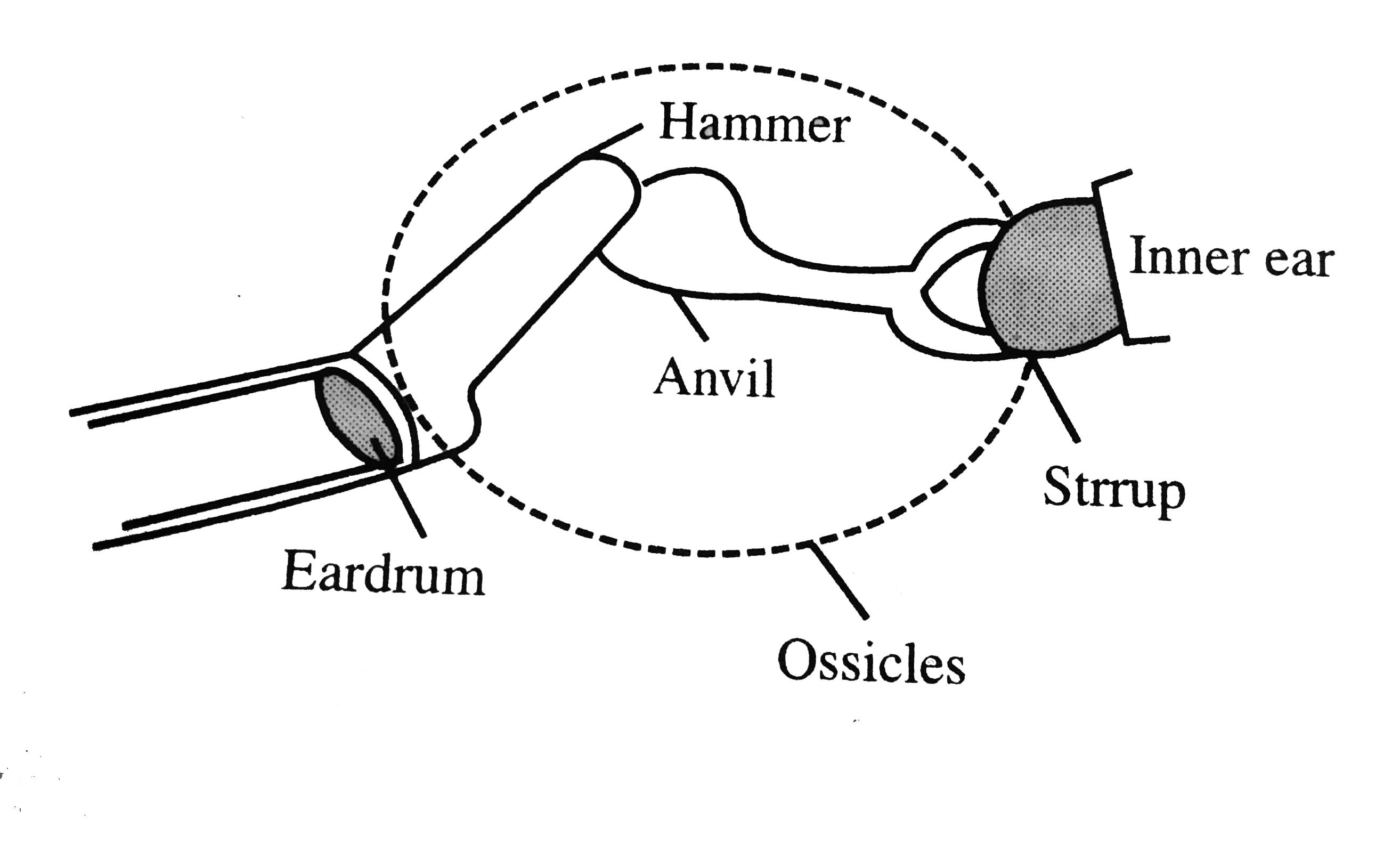
When a sound wave enters the ear, it sets the eardrum into oscillation, which in turn causes oscillation of 3 tiny bones in the middle ear called ossicles. This oscillation is finally transmitted to the fluid filled in inner portion of the ear termed as inner ear, the motion of the fluid disturbs hair cells within the inner ear which transmit nerve impulses to the brain with the information that a sound is present. The theree bones present in the middle ear are named as hammer, anvil and stirrup. Out of these the stirrup is the smallest one and this only connects the middle ear to inner ear as shown in the figure below. The area of stirrup and its extent of connection with the inner ear limits the sensitivity of the human ear consider a person's ear whose moving part of the eardrum has an area of about 50mm2 and the area of stirrup is about 5mm2. The mass of ossicles is negligible. As a result, force exerted by sound wave in air on eardum and ossicles is same as the force exerted by ossicles on the inner ear. Consider a sound wave having maximum pressure fluctuation of 4×10−2Pa from its normal equilibrium pressure value which is equal to 105Pa. Frequency of sound wave in air is 332ms. Velocity of sound wave in fluid (present in inner ear) is 1500ms. Bulk modulus of air is 1.42×105Pa. Bulk modulus of fluid is 2.18×109Pa.
Q. With respect to information provided above, mark the correct statement.
View Solution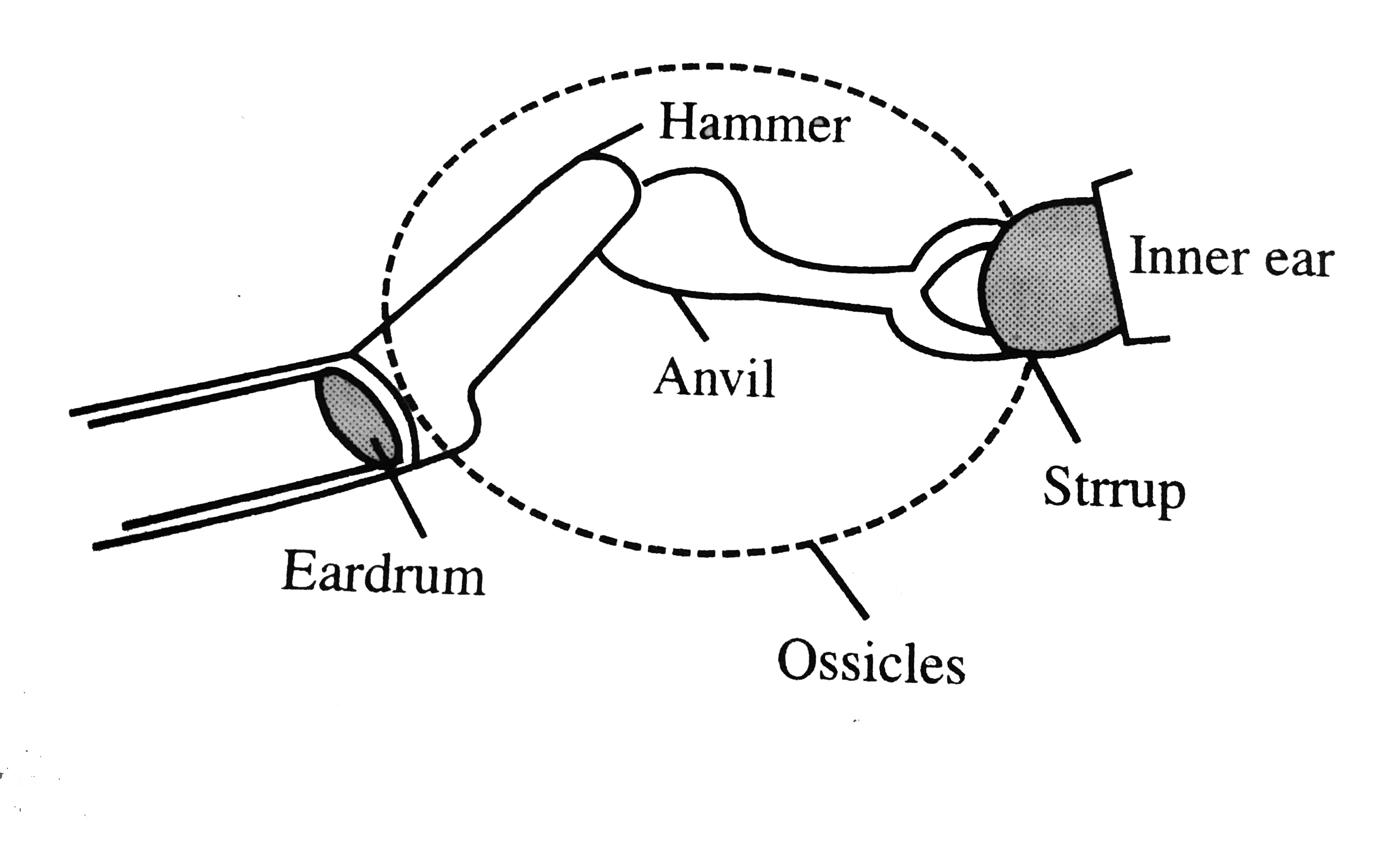
When a sound wave enters the ear, it sets the eardrum into oscillation, which in turn causes oscillation of 3 tiny bones in the middle ear called ossicles. This oscillation is finally transmitted to the fluid filled in inner portion of the ear termed as inner ear, the motion of the fluid disturbs hair cells within the inner ear which transmit nerve impulses to the brain with the information that a sound is present. The theree bones present in the middle ear are named as hammer, anvil and stirrup. Out of these the stirrup is the smallest one and this only connects the middle ear to inner ear as shown in the figure below. The area of stirrup and its extent of connection with the inner ear limits the sensitivity of the human ear consider a person's ear whose moving part of the eardrum has an area of about 50mm2 and the area of stirrup is about 5mm2. The mass of ossicles is negligible. As a result, force exerted by sound wave in air on eardum and ossicles is same as the force exerted by ossicles on the inner ear. Consider a sound wave having maximum pressure fluctuation of 4×10−2Pa from its normal equilibrium pressure value which is equal to 105Pa. Frequency of sound wave in air is 332ms. Velocity of sound wave in fluid (present in inner ear) is 1500ms. Bulk modulus of air is 1.42×105Pa. Bulk modulus of fluid is 2.18×109Pa.
Q. If the person is using an hearing aid, which increase the sound intensity level by 30 dB, then by what factor the intensity of given sound wave change as perceived by inner ear?
View Solution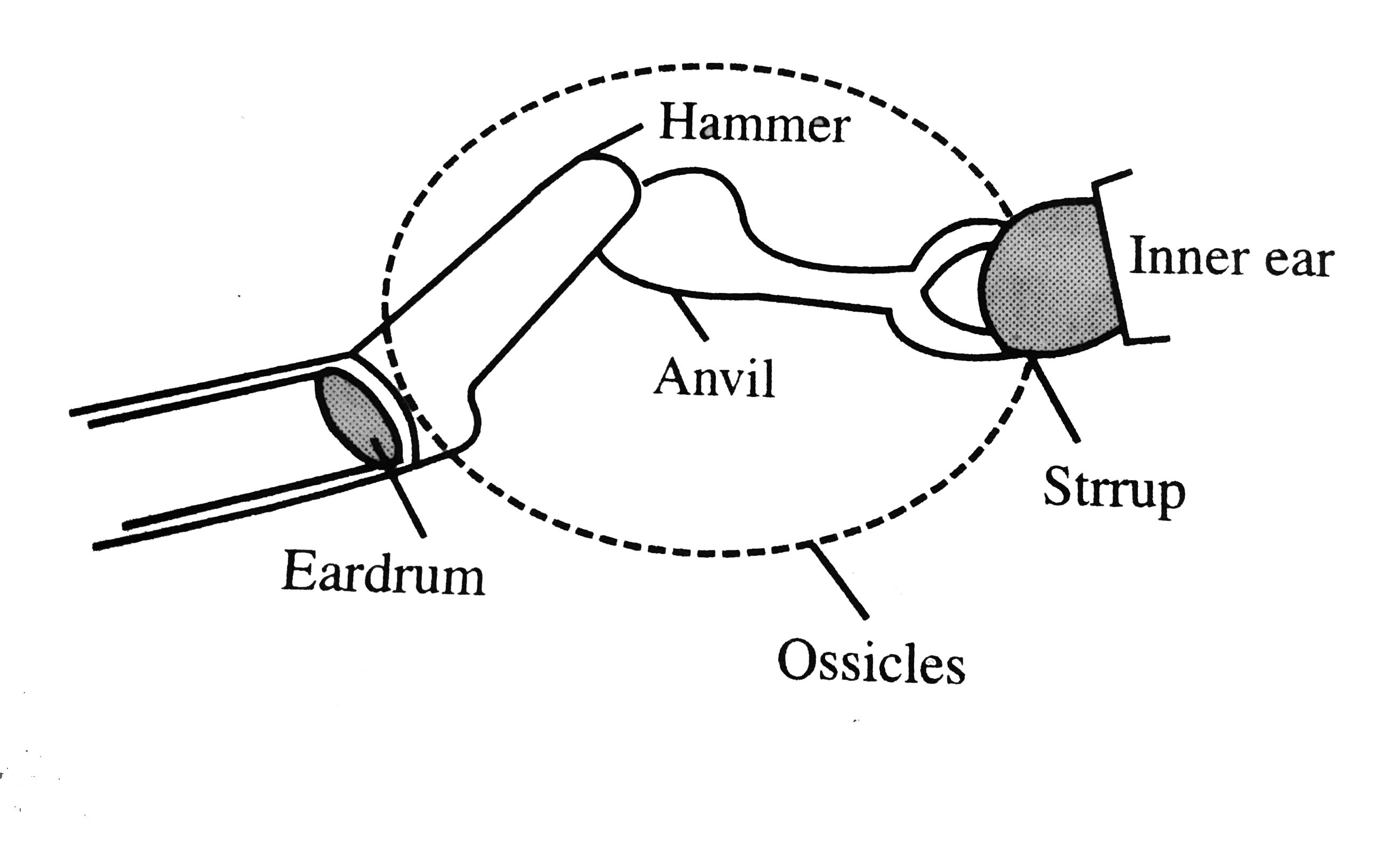
When a sound wave enters the ear, it sets the eardrum into oscillation, which in turn causes oscillation of 3 tiny bones in the middle ear called ossicles. This oscillation is finally transmitted to the fluid filled in inner portion of the ear termed as inner ear, the motion of the fluid disturbs hair cells within the inner ear which transmit nerve impulses to the brain with the information that a sound is present. The theree bones present in the middle ear are named as hammer, anvil and stirrup. Out of these the stirrup is the smallest one and this only connects the middle ear to inner ear as shown in the figure below. The area of stirrup and its extent of connection with the inner ear limits the sensitivity of the human ear consider a person's ear whose moving part of the eardrum has an area of about 50mm2 and the area of stirrup is about 5mm2. The mass of ossicles is negligible. As a result, force exerted by sound wave in air on eardum and ossicles is same as the force exerted by ossicles on the inner ear. Consider a sound wave having maximum pressure fluctuation of 4×10−2Pa from its normal equilibrium pressure value which is equal to 105Pa. Frequency of sound wave in air is 332ms. Velocity of sound wave in fluid (present in inner ear) is 1500ms. Bulk modulus of air is 1.42×105Pa. Bulk modulus of fluid is 2.18×109Pa.
Q. This person (without hearing aid machine) is sitting inside a busy restaurant where average sound intensity is 3.2×10−5Wm2. How much energy in the form of sound is taken up by the person in his meal time of 1 h?
View SolutionMiddle ear has
View SolutionMiddle ear has
View SolutionFrom outer to inner side, the sequence of three bones present in the middle ear of mammals is
View SolutionLargest ear ossicle is
View SolutionLargest ear ossicle is
View Solution